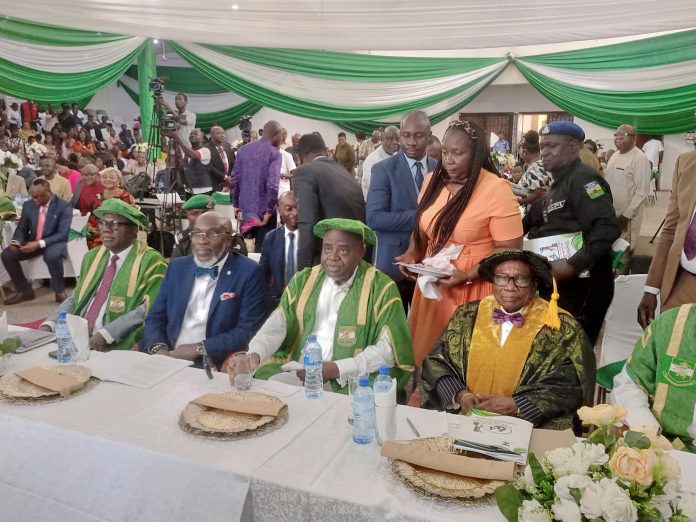Bayelsa State Governor, Douye Diri, has criticized Nigeria’s federalism model, calling it an aberration that allows only the federal government to create local governments.
Douye also expressed concerns that Nigeria is on the wrong development path and needs to change course.
It’s worth noting that Governor Diri’s stance on federalism is not new, and his concerns about Nigeria’s development path are shared by many.
Delivering a lecture titled, Rethinking Our Future: The Need For True Federalism and Economic Renaissance, at the 64th Founders’ Day Lecture of the University of Nigeria in Nsukka, Enugu State, the Bayelsa governor maintained that states should constitutionally have the right to create and legislate on local governments in a truly federal structure.
Although he reaffirmed his belief in the unity of Nigeria, he said it can only be sustained on the basis of equity, justice and fairness.
Governor Diri described federalism as a very touchy subject that concerns Nigeria’s corporate existence.
He said the fact that true federalism has become a lexicon that reverberates across the socio-political landscape of Nigeria underscores the defective nature of the governance structure operational in the country, a situation which has led to constant agitations.
The guest lecturer expressed concern that the misgivings of ethnic nationalities and minority interests about the inequities and disequilibrium that defined the political paradigm at the time of independence in 1960 still persist and stressed the need for a paradigm shift where the dreams and aspirations of Nigerians will not be deferred perpetually.
According to him, the current governance structure in Nigeria cannot deliver the future the vast majority of Nigerians desire and deserve.
The Bayelsa helmsman remarked that Nigeria had reached a pivotal point, a crossroads that demands wise decision-making to determine the nation’s destiny and secure a prosperous future, stressing that Nigerians must engage in frank conversations about how to create a more perfect union that embraces diversity while pursuing common goals.
Diri queried Nigeria’s current federalism, saying it was meant to serve the interest of the colonial masters as against the ideal pattern of forming a federation where states willingly come together to form a nation, as it is in the United States of America.
He recalled how a son of the Niger Delta and of the Ijaw nation, Isaac Jasper Adaka Boro, pioneered minority rights activism in the country, beginning his revolutionary journey during his days at the University of Nigeria where he was president of the students union government during the 1964/65 session.
He also argued that the current governance structure in Nigeria has left oil-producing communities impoverished despite being the backbone of the country’s economy and advocated the reconsideration of the Land Use Act of 1978, which he described as a paradox and that no meaningful development can take place in a situation where states cannot control their resources.
The governor further noted that every state in Nigeria was blessed with natural resources as well as peculiar needs and should be allowed to harness the resources, manage them and develop at their own pace while contributing a percentage to the government at the centre.
He also stressed the need for state police, citing recent developments in Rivers State during the local government election and the Bayelsa situation in Bassambiri community during the 2023 governorship election where police was used against the people, saying states must have the power to take charge of their security.
His words: “We are all aware of the ongoing conversation around the issue of autonomy of local governments. My concern over this sensitive subject is beyond the question of autonomy and more about the rationale for their creation. The current system, which allocates funds based on the number of local governments, puts some states, especially Bayelsa with just eight, at a disadvantage. This disparity arises because states with more local governments receive a larger chunk of resources, regardless of their specific requirements or financial strength.
“Since the Constitution exclusively recognises states and the federal government as federating units, the federal government’s creation of local governments constitutes an aberration, undermining the principles of federalism and state autonomy. The Constitution’s clear delineation of federal and state powers renders the federal government’s creation of local governments incongruous, as local governance falls within the purview of state authority. My take to addressing this issue is enforcing states’ autonomy to create local government areas tailored to their unique needs and financial capacity to do so.
“In the context of Nigeria, the term “true federalism” has become a rallying cry for those seeking autonomy, resource control, addressing issues of marginalisation and good governance. It is about moving away from a system that can properly be described as “unitary federalism” or a “federation without federalism.”
“For the avoidance of doubt, I wholeheartedly support the Nigerian state and its continuous unity and existence. However, I recognise that, like any nation, we strive for a more perfect union. A union where diversity is celebrated, equity ensured and opportunities are accessible to all.
“Consequently, we must rethink our future and build a political culture where the promise of federalism is not a mere illusion of unity, but a powerful catalyst that drives our passion for success and unlocks untapped potential.”
Earlier, the UNN Acting Vice Chancellor, Prof. Polycarp Chigbu, said the event is to celebrate the founding fathers of the institution led by the late Dr. Nnamdi Azikiwe, whose vision led to its establishment on October 7, 1960.


